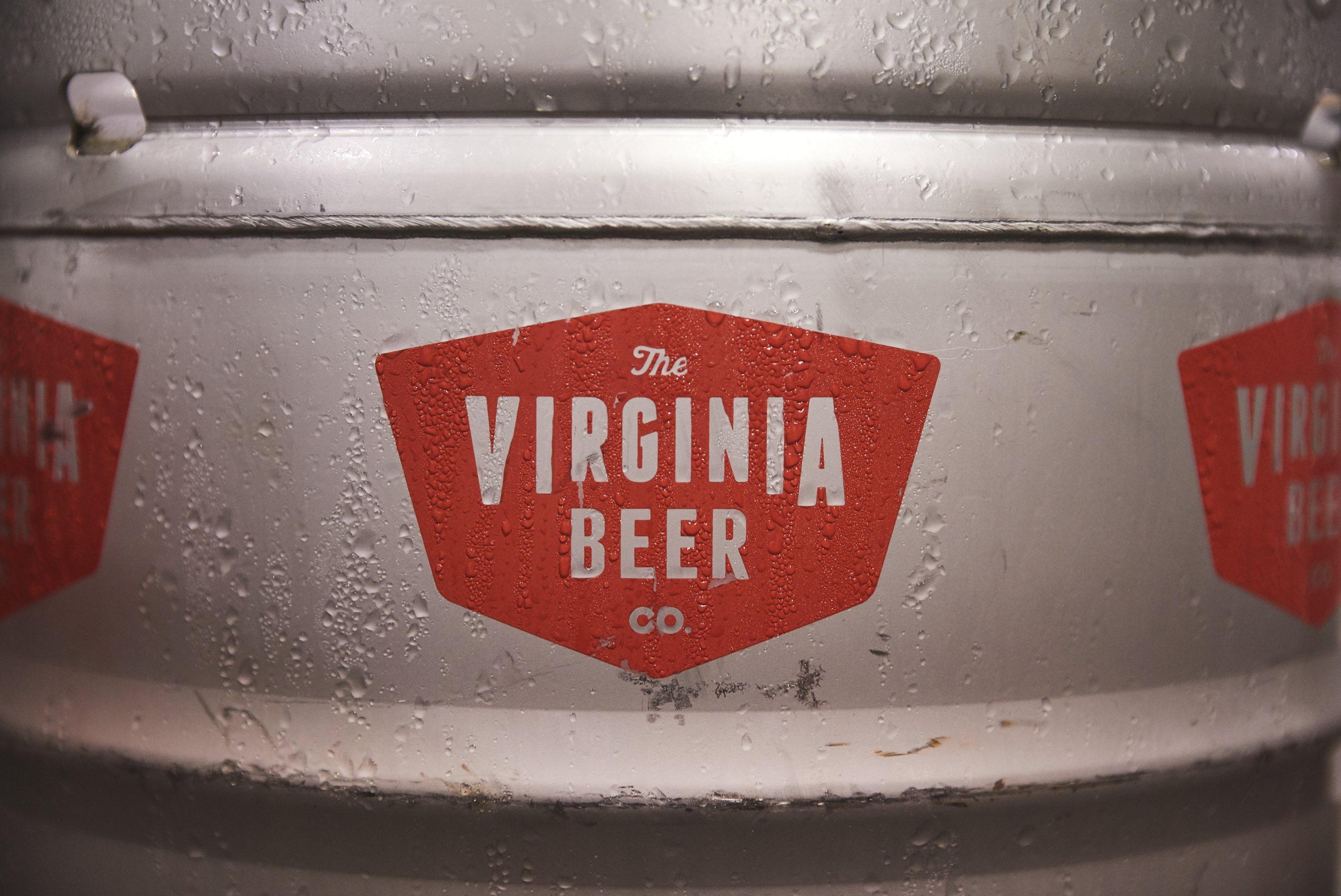If anything, Williamsburg seemed too obvious a place for Robby Willey ’05 and Chris Smith ’07 to open a craft brewery. They met there while students at William & Mary, discovered craft beer at the Green Leafe Cafe and for several years each returned to town quarterly for Annual Giving Board meetings.
Hark Upon the Ale
September 4, 2019
By
Ronnie Crocker M.B.A. '88
So when Willey and Smith decided they were ready to quit their corporate jobs to open a craft brewery, they looked at places like Northern Virginia, which had a proven market for the product they wanted to create; Augusta, Georgia, with its built-in annual tourist draw of the Masters Tournament; and Blacksburg, Virginia, a lively college town with a desirable demographic for people looking to make and sell beer.
“Williamsburg was not at the top of the list,” says Willey.
As the two did more research, however, they realized that Williamsburg had favorable demographics as well, plus a growing population. It, too, was an established travel destination in a significant tourism corridor. Critically, it also offered something that entrepreneurs in the U.S. craft brewing industry truly prize — an authentic story, based on their shared love of the place.
In the end, the location for The Virginia Beer Company really was an obvious choice.
“The short answer to that is William & Mary,” Willey says.
Robby Willey and Chris Smith are just two of the many alumni who’ve taken the leap into the dynamic craft beer industry that has redefined American beer.
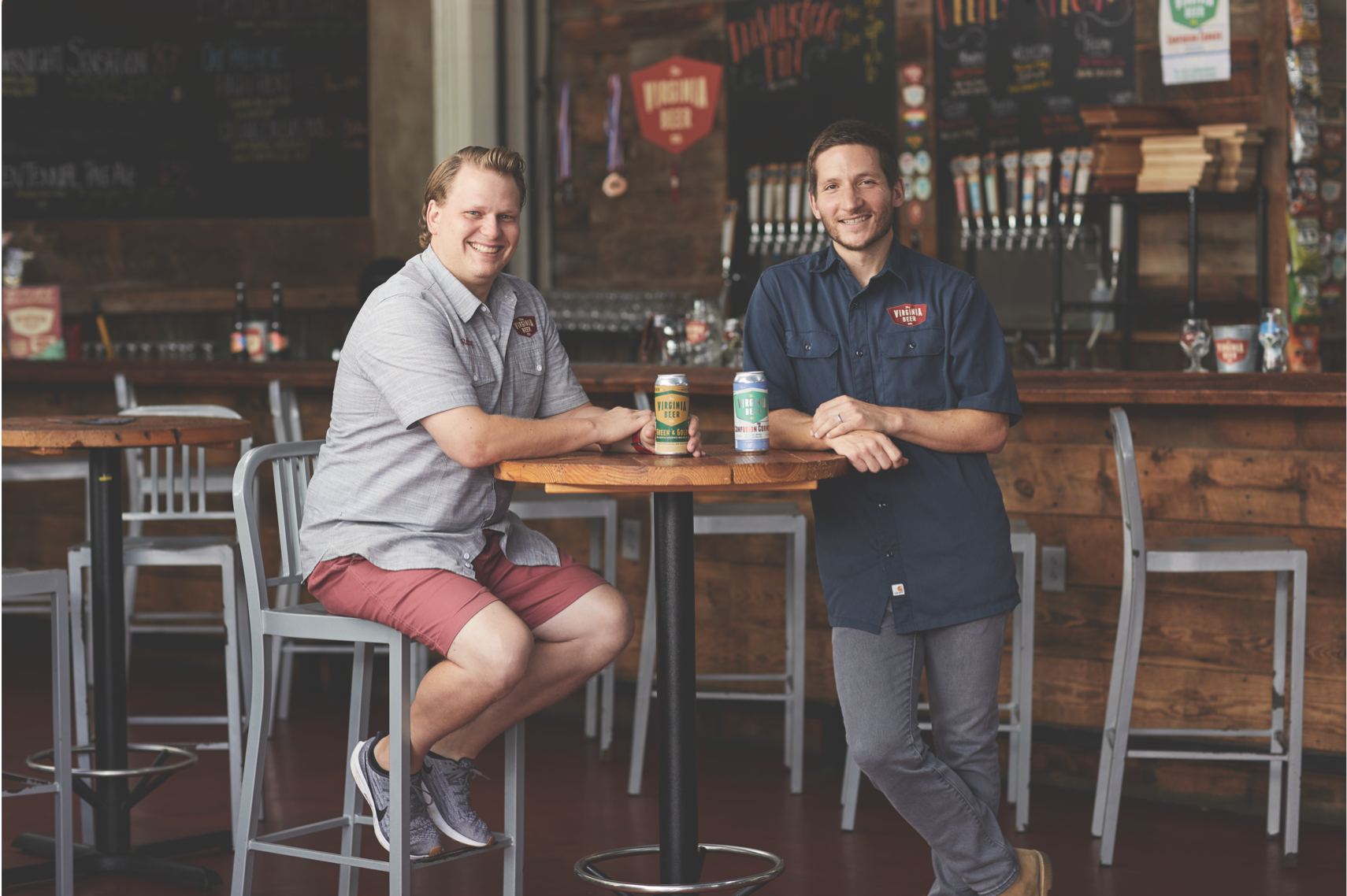
A Fight for Hearts and Minds
It’s no surprise to find W&M graduates among the growing tribe of brewers, homebrewers, beer distributors, bar owners and other industry professionals. As a journalist who has covered the craft brewing phenomenon for a decade, I’ve met hundreds of these men and women and I have always been struck by the creativity, intelligence, zeal and sheer energy they bring to their work.
Collectively, they have grown craft beer from a niche business into a $27.6 billion-dollar enterprise that is challenging, and even building partnerships with the global behemoths that for decades controlled what Americans could drink and what the rest of the world thought of beer made in the USA.
It is hard to imagine today, but as late as 1984 there were fewer than 100 breweries operating in the U.S., a crippling legacy of Prohibition and the massive consolidation that began in the middle decades of the 20th century. The raging debate was a marketing contrivance: “tastes great” vs. “less filling.”
Options for anyone seeking a fuller-flavored alternative were limited to homebrew clubs, import shops and pubs like the Green Leafe.
By 2018, though, the nation boasted 7,450 breweries, 98.6 percent of them micro-breweries, regional craft breweries or brewpubs. Domestic output overall fell by 0.8 percent, but craft beer production continued to grow, rising by 3.9 percent.
The Brewers Association trade group notes that craft’s share of the market grew to 13.2 percent, rivaling imports’ 18.4 percent share. In terms of dollars, craft beer grew by an enviable 7 percent.
So, of course W&M would be part of this transformation.
Already, in addition to the three-year-old Virginia Beer Company, you can sample the handiwork of a fellow alumnus while hoisting an IPA or pilsner at the Smartmouth or Pleasure House taprooms in Virginia Beach or enjoying a “real ale” pulled from a cask engine at Chesepiooc in Maryland. If you find yourself in the craft-beer mecca of Colorado, look for alumnus-run Beyond The Mountain in Boulder or check out Breckenridge Brewery, a national top-seller. And even in Beijing, there’s a W&M grad making a go of it at Jing-A Brewing, a hangout for ex-pats and locals alike.
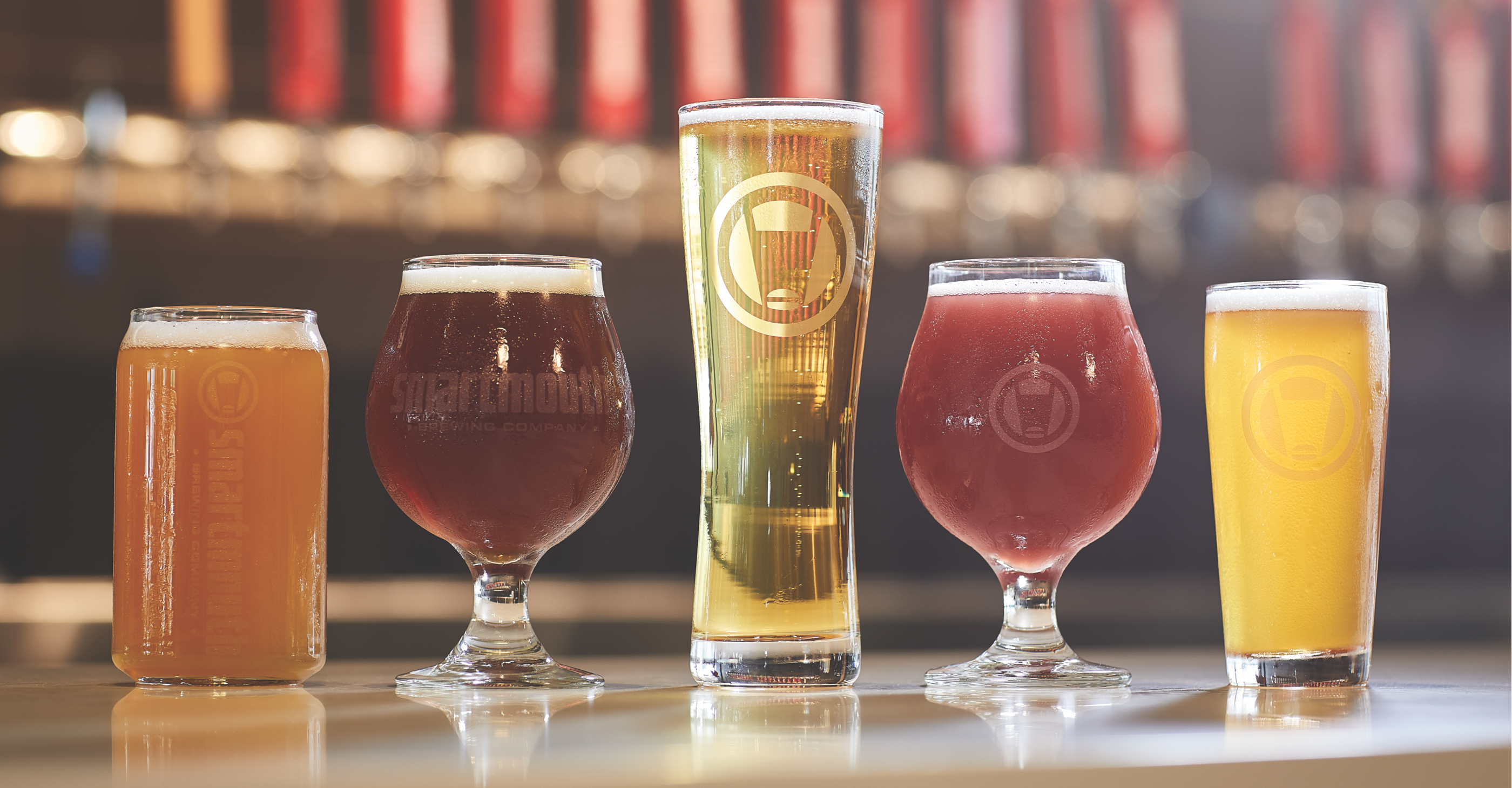
A frothy leap of faith
Jimmy Loughran Jr. ’05 studied history and education, but he was never meant for a desk job. After graduating W&M, he built homes with Habitat for Humanity in California. He returned to Virginia and served five years as a Newport News firefighter. When he took on a second job, it was cleaning kegs at a brewery in Norfolk and learning all he could.
Turns out he had a knack for brewing, which he developed with a career change and a job at the brewpub chain Gordon Biersch. That taught him how to be a better brewer, but he credits the lessons from college for helping him rise to the challenge in the first place.
“Through William & Mary, I recognized I can work through a lot of problems,” he says.
He’s now head brewer at Norfolk-based Smartmouth Brewing, which was co-founded in 2012 by another W&M alumnus, Chris Neikirk ’88.
The big brewery in Norfolk is where Loughran and his team brew Smartmouth’s core beers, including a saison, an India pale ale and an amber, which are distributed across the state.
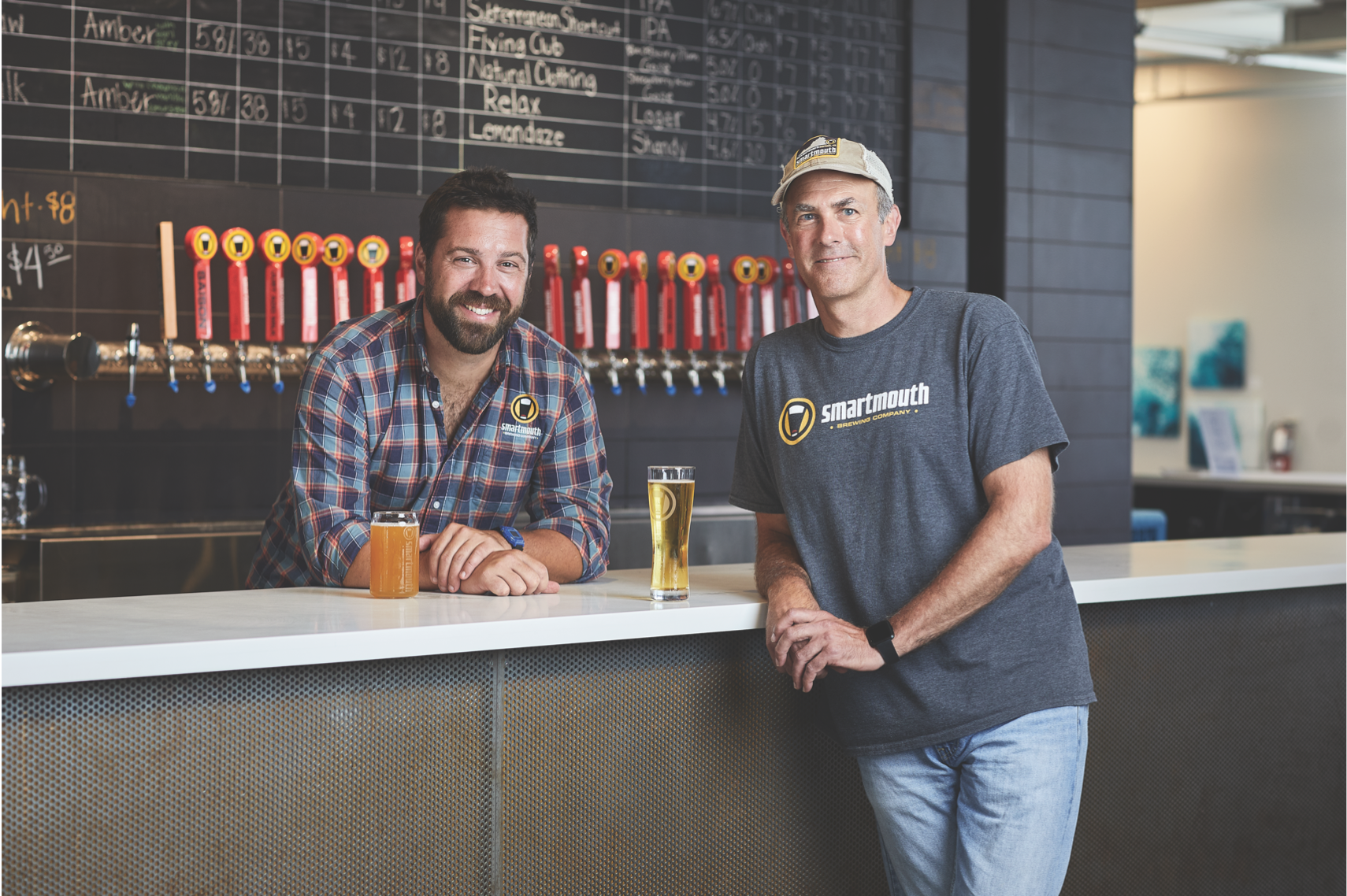
At the smaller, consumer-focused Pilot House location that opened two years ago, they experiment with new hops, new yeast strains and new combinations of ingredients. On a recent weekday, for example, Loughran and Neikirk brewed a double IPA with the relatively new and popular Mosaic and Enigma hops. That beer will be sold on site only. It may or may not ever show up on the menu again.
That’s not merely an artistic indulgence, but a business imperative. Craft beer fans are forever on the lookout for new tastes and the next new thing. To keep customers coming back, the Pilot House will probably release about 60 different beers this year, Loughran said.
It used to be about 10, but the marketplace has made its wishes known.
“There are so many small breweries and new breweries that you can find a new beer every day,” Loughran says.
He doesn’t mind the competition, though, or the grinding hard work that craft beer romantics don’t always appreciate.
“I’m drenched with sweat, but I enjoy what I’m doing,” he says.
Neikirk is pretty good at making beer, too, and in 1996 one of his homemade IPAs won first place in an American Homebrewers Association competition. Already he was toying with the idea of turning his hobby into a career, and he even worked on a business plan for a brewery while an MBA student at the University of North Carolina.
Ultimately, he and his wife decided it was “not the safe choice” and he stayed with his finance job — which he still holds and says he still very much enjoys — with the railroad company Norfolk Southern.
It would not be until 2010 that he would get truly serious about professional brewing. A long chat with a friend, Porter Hardy, on New Year’s Day sealed the deal. They finished the business plan, raised about $1 million from a small group of investors, mostly friends, and leased a site in Norfolk. Smartmouth opened its doors in November 2012.
The next fall, Smartmouth’s high-octane Notch 9 double IPA won a bronze medal at the prestigious Great American Beer Festival (GABF) competition. The beer’s name is rooted in the railroads. Notch 9 is a “Spinal Tap”-esque reference to a train throttle, which has only eight notches. For this beer, the brewers really did turn the level up to nine, as in a walloping 9.1 percent alcohol by volume.
(Don’t fear, those who enjoy an easier-drinker can try the Virginia Craft Brewers Festival’s award-winning Safety Dance Pilsner, which is a little over half as strong.)
Neikirk hopes eventually to join his wife, also named Chris Neikirk, in working full-time at the brewery. That will have to wait, perhaps until he is fully vested in the Norfolk Southern retirement plan. In the meantime, the railroad company has moved its headquarters to Atlanta and is bringing the Neikirks along.
But Neikirk says he will be back in Virginia after retirement, and will start spending some quality time in the brewhouse.
“My plan is to come back and actually brew,” he says. “That’s why I got into this.”
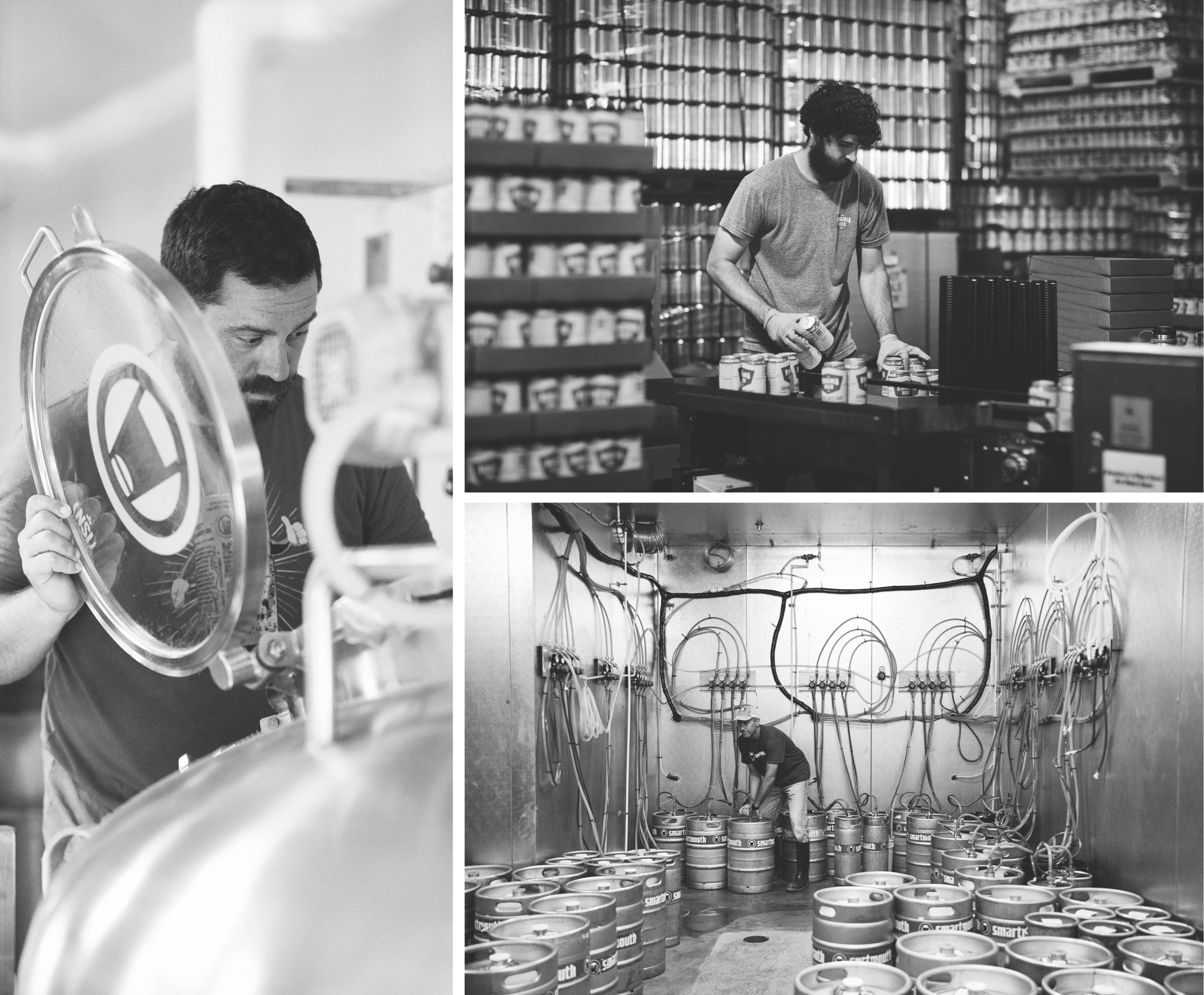
The Horizons Grow
Chuck Hixon ’11 was introduced to home-brewing by a fraternity brother and he never looked back. He left school to learn the trade at Williamsburg’s Alewerks Brewing Company. After a couple of years, he moved to Colorado, which is a magnet for ambitious brewers. He honed his skills at Boulder’s Twisted Pine Brewing Company, whose trophy case features nine GABF medals and three more from the World Beer Cup.
A childhood friend joined him out west, and soon the two men were looking for a place to start their own business. Their most important requirements, Hixon says, were tall ceilings and affordable rent.
They found a space in Boulder, not far from the local brewers guild, and opened the doors to Beyond The Mountain Brewing Company on Dec. 9, 2017. Because craft beer is so prevalent in Colorado, Hixon says, getting shelf space in stores is difficult. Thus, Hixon and business partner Morgan Way focus on creating a fun atmosphere with live music and a continuously rotating mix of beers.
Their slogan is “Improvisational Ales,” and one of Hixon’s personal favorites is a basil saison.
“That’s one I’m very proud of,” he says.
Another fave is a pale ale infused with passion fruit and guava. IPAs are the top sellers, but the tap list includes Scotch ales, imperial stouts and a raspberry stout. Hixon and Way like brewing varying styles. They’ve started a barrel-aging program as well for beers to absorb the flavor of whiskey, wine or other spirits.
“We’re all over the place,” Hixon says.
Colorado also has legalized medical and recreational marijuana, introducing a potential competitor to the beer business. Hixon, though, says the products coexist just fine, and he sees people enjoy both.
“You don’t get as many angry drunks when you’re combining the two,” he jokes.
Chatter among brewers now often turns to infusing beers with THC, the ingredient of pot that creates a high, and consumers have expressed interest as well. But so far, the murky relationship between federal and state regulations has made it too risky for Hixon’s taste. Besides, he says, he didn’t really like the one THC beer that he tried.
On the other hand, he’s intrigued by cannabidiol, or CBD, which is more broadly available and popping up in a host of candies, lotions and other products to soothe aching muscles or help people relax.
“I think a CBD beer would be really cool to make,” he says. “It’s a great way to ingest CBD for anxiety on a more casual basis.”
But he’s holding off for now, waiting until the legal questions become fully settled.
He’s also spotting what might be yet another new trend, with more people choosing to take their beer with them. Growler sales — in which customers bring in their own container for a to-go fill — now account for 15 percent of sales and appear to be growing.
That’s another reason for breweries like Beyond The Mountain to make their taprooms as inviting as possible and offer enough variety that customers will keep coming back for more.
Translating the American Dream
Alex Acker ’00, whose mom is from Taiwan, minored in Chinese at William & Mary. After graduation, he went to Beijing Normal University as part of a W&M-sponsored fellowship to teach English there. That was followed by a 10-year stint in marketing and corporate communications for Ogilvy and Apple, also in China. Then he, too, climbed down from the corporate ladder to make his homebrewing hobby his job in his adopted homeland.
“I was here in Beijing when we started Jing-A and it was a side project at the start,” he said by email. “I left my job at Apple to go full time on Jing-A in 2013, once we started to get some more serious press.”
Acker very much shares American brewers’ fondness for experimentation as well as their commitment to making sure their beers are locally rooted, wherever those roots happen to be.
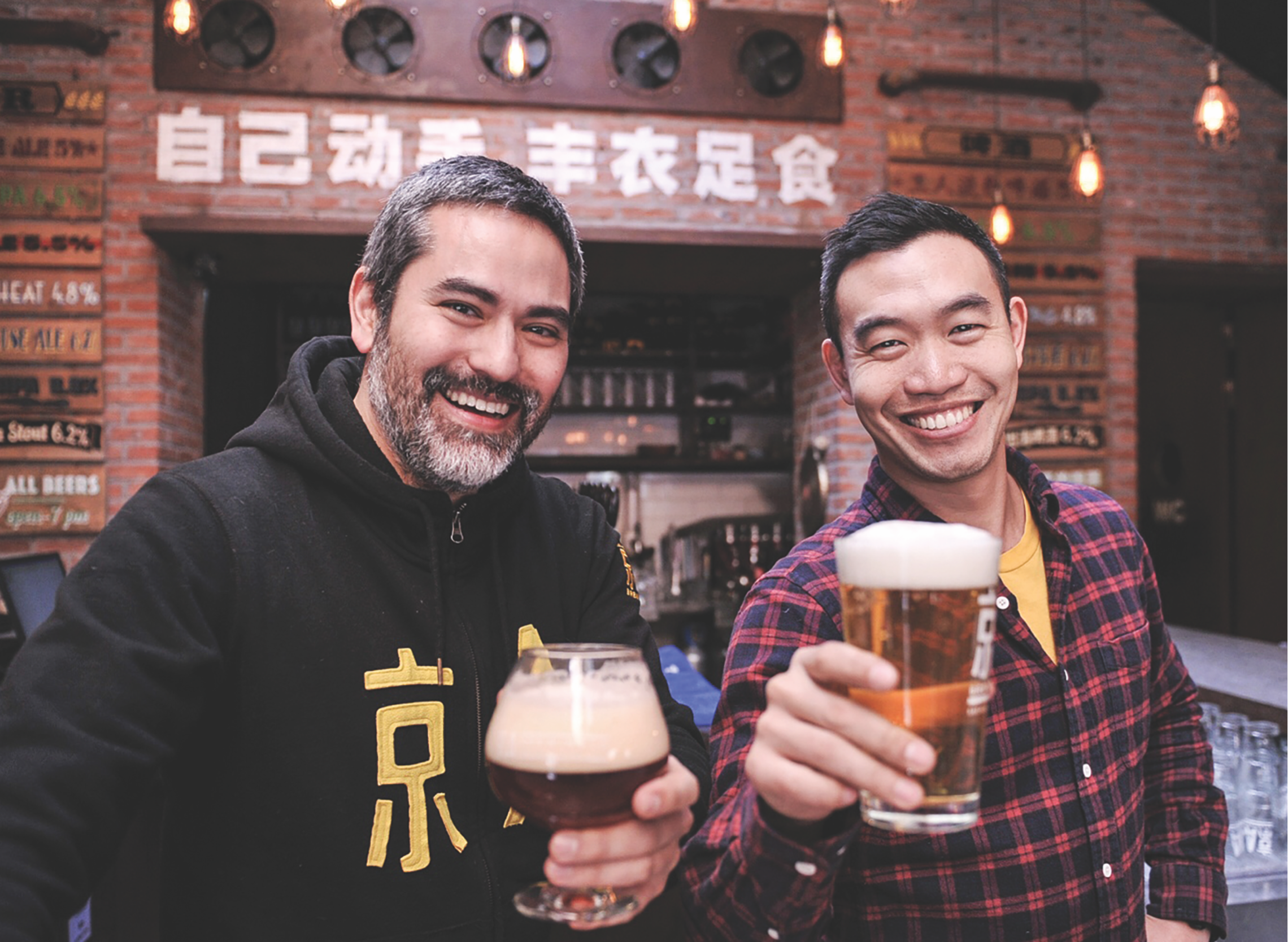
“We’ve pushed the envelope with beers and art that either incorporate interesting Chinese ingredients (like Koji Red Ale with fermented red sake rice, What about Mi, a mixed-fermentation rice wine farmhouse ale, or Mijiaya ancient ale collaboration with archaeologists from Stanford) or tie to Beijing life/culture (like with our Airpocalypse DIPA — hazy and unfiltered like the Beijing air on a bad day),” he says.
Popular beers include that imaginative rotation of smaller batches, as well as Worker’s Pale Ale, Flying Fist IPA and Mandarin Wheat.
“We’re maybe best known for our hazy (sometimes fruited) IPAs, our kettle sours and goses, and our mixed ferm/farmhouse ale projects,” Acker says.
Getting established took “many late nights and weekends working on our beers,” but Acker and his business partner now have help in the brewhouse and are looking to expand. They have the same small brew-pub that opened in 2013 and are preparing to open a new taproom in the city.
“We also distribute a core selection of our beers nationally across China, so they can be found in major cities, like Shanghai, Chengdu, Guangzhou, and many others,” Acker says. “We don’t export yet, but it’s something we’re keen to do!”
In a sense, though, Jing-A already has been part of the broader exporting of the American craft beer experience and its sensibilities.
Heady days may be here to stay
Terry Usry ’88 of Breckenridge Brewery has seen the business grow in unexpected ways over the last three decades. She and her husband played a role in building craft beer from something that had to be discovered into a thriving industry that has gotten the attention of the world’s biggest beer companies.
Terry and Todd Usry, a Virginia Commonwealth University grad, were “ski bums” in Steamboat Springs, Colorado, in 1990, she recalled. On a family trip to California, Todd’s parents took the couple “to this cool place for a fresh beer — Seabright Brewery.”
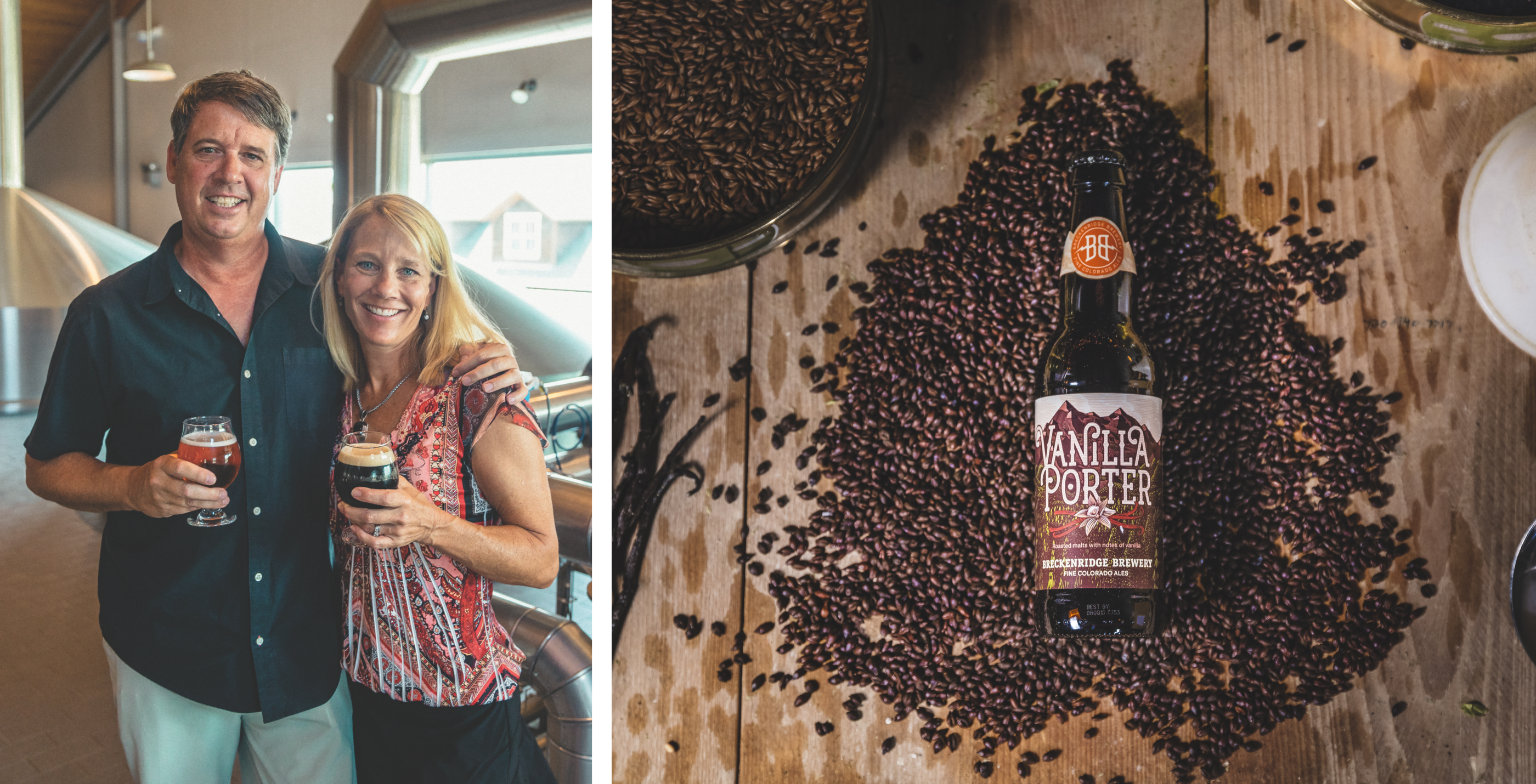
“The concept of a U.S. bar brewing its own beer blew us away, and the beer was delicious!” Terry says.
They were motivated to get into the fledgling business for themselves, and discovered a recently opened brewpub called Breckenridge Brewery once they got back home to Colorado. It was one of just three in the state at the time. Over time — and over “many Avalanche Ales,” Usry says — the young couple and a good friend from Virginia decided to invest in the fledgling business.
“At the time, Breck was considering opening a packaging brewery in Denver,” Usry says. “We joined forces, moved to Denver, and helped get the second Breckenridge Brewery facility off the ground.”
The brewery today produces scores of beers, including such well-known brews as Vanilla Porter and 471 Small Batch IPA.
Todd is president of the company and Terry, though recently retired, continues to promote the brand and focus on its philanthropic efforts, including “Breck Gives Back,” a foundation that gives money to causes benefiting veterans, first responders, education, music and environmental action.
“We’re running a program right now through the summer called Pints for Parks,” Terry says. “For every Breck pint ordered at any bar or restaurant, we’ll donate a portion of the proceeds to support our National Parks.”
Earlier this year, she and Todd met with lawmakers in Washington, D.C., to promote law changes that would help the industry and preach the message of craft brewing’s “wildly successful and economically impactful” influence on their state.
That potential impact was multiplied in 2016, when Breckenridge was acquired by the craft division of global brewing giant Anheuser-Busch InBev — part of a spate of high-profile takeovers that, while disappointing to some longtime craft fans, infused these growing businesses with needed capital, and a lot of it.
So far so good, Terry Usry says. Todd was contracted to keep running the company for five years, and he and Anheuser-Busch InBev have already extended that.
“We’ve both benefited from the additional resources,” she says, “to improve brewery and restaurant operations, safety, quality, marketing, sales, public relations and philanthropy.”
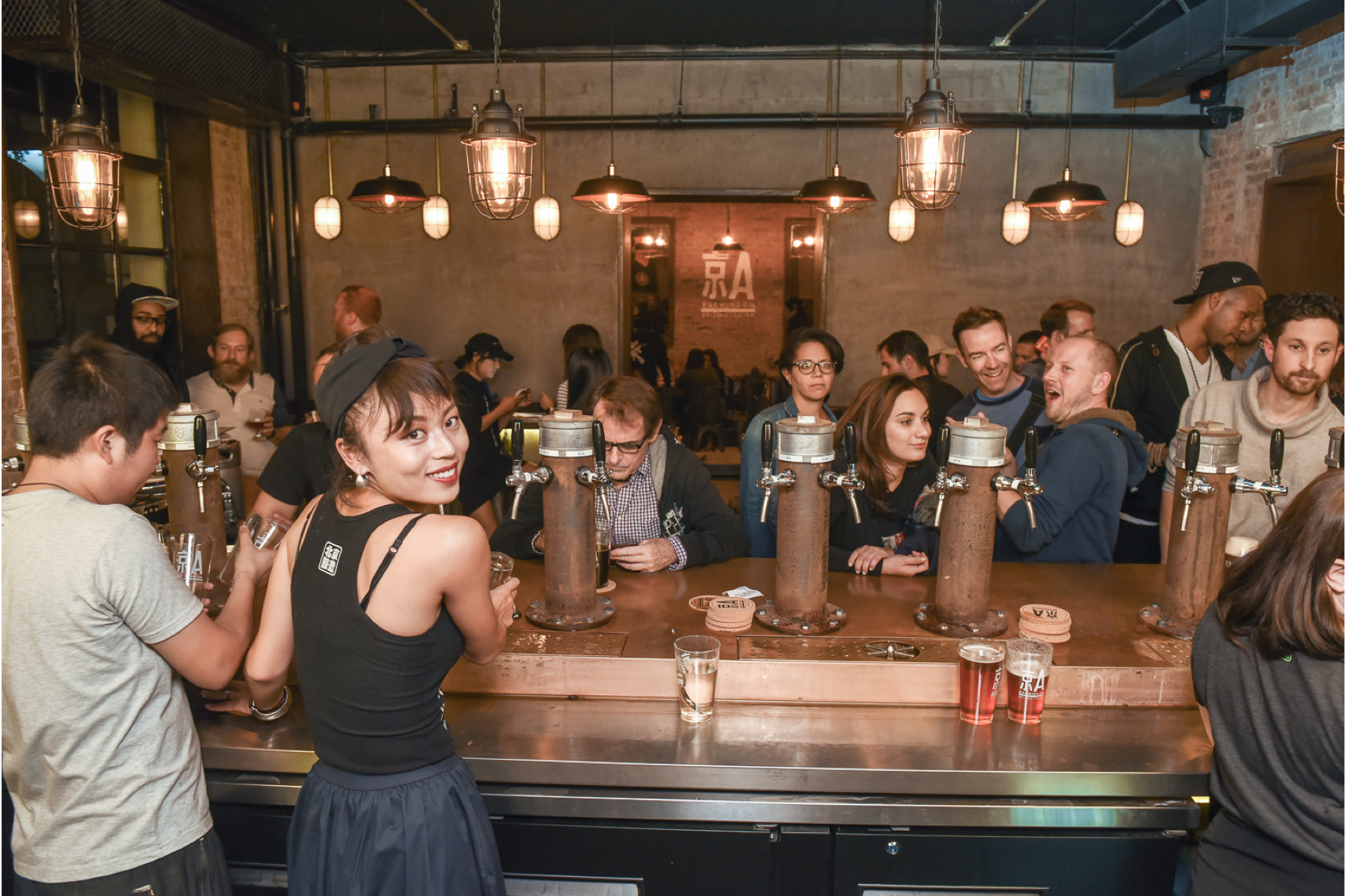
Reaching new generations
Craft brewing is about much more than the liquid in the bottle, can or keg. That liquid is undeniably better than it used to be, but the business is defined by community in ways that makes it stand out in American industry.
Take Willey and Smith of The Virginia Beer Company, two men whose friendship started in college but endured long after graduation. Willey was the best man at Smith’s wedding and the two often visited craft breweries while Smith’s wife Erin was busy studying veterinary medicine at Tufts University. They built successful careers in the Washington, D.C., area and Manhattan, respectively. And then they decided to build something from scratch.
Three and a half years ago, the longtime college chums opened a brewery in an abandoned auto garage and now brew thousands of barrels of beer annually, selling it from Virginia Beach to Richmond and in an onsite taproom that is open six days a week. They’ve added their own canning line and bought enough new fermentation tanks to double their output as they look to expand distribution to Northern Virginia next year and the western side of the state as early as the year after.
Virginia Beer also employs 14 people locally and supports other retail jobs. Smith and Willey are active in the Chamber of Commerce, the local economic development organization, and, of course, their alma mater. They support local charities and arts groups and each year they host the local One Tribe One Day reception in their taproom for William & Mary’s biggest day of giving.
“The community bought into us because we dived head first into the community,” Willey says.
The co-founders remain interested in finding “responsible” ways to support the university, mindful of the sometimes-fraught relationship between college students and alcohol.
So if you return to Williamsburg for Homecoming & Reunion Weekend this fall, be sure to look for a special-release beer that Virginia Beer Company makes and sells only during that time, in part to support the Scholarships Impact Fund.
What’s it called? Green & Gold Experimental IPA.
Another Round
Virginia Beer Company, Smartmouth, Beyond the Mountain, Jing-A and Breckenridge are just a few of the W&M-affiliated breweries in the business. As we learn of more we'll add them to our list below. Know of one not on the list? Email alumni.magazine@wm.edu with the info.
- Center of the Universe Brewing Company (Chris Ray ‘05, founder) – Ashland, VA
- Chesepiooc Real Ale Brewery (Jon Esposito ‘88, founder), Crofton, MD
- Duck-Rabbit Craft Brewery (Robert Owen ‘03, representative), Farmville, NC
- John I. Haas (Jeff Dailey ‘10, senior sensory scientist), Yakima, WA
- Mare Island Brewing Co. (Kent Fortner ‘92, founder), Mare Island, CA
- Pleasure House Brewing (Charles Stephenson ‘92, owner), Virginia Beach, VA
- Reyes Beverage Group (Jessica Muskey ‘00, craft brand director), many locations
- Stem Ciders (Dave Duffy M.B.A. ‘94, chief commercial officer), Denver, CO
- The Veil Brewing Company (Dave Michelow ‘86, president and co-founder), Richmond, VA
